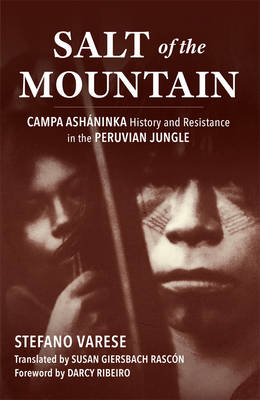
- Retrait gratuit dans votre magasin Club
- 7.000.000 titres dans notre catalogue
- Payer en toute sécurité
- Toujours un magasin près de chez vous
- Retrait gratuit dans votre magasin Club
- 7.000.000 titres dans notre catalogue
- Payer en toute sécurité
- Toujours un magasin près de chez vous
Salt of the Mountain
Campa Asháninka History and Resistance in the Peruvian Jungle
Stefano VareseDescription
For four centuries, the indigenous Campa Asháninkas of the Peruvian Amazon have fought for their identity and independence in the face of Spanish colonialism and Peruvian national expansionism. Stefano Varese originally wrote about the Campa Asháninkas in the mid-1960s after three seasons of field research among them and three years of archival research, titling his book La Sal de Los Cerros after the conquered Mountain of Salt that had been the center of Camp Asháninka trade and power for millennia. Updated with a new preface and introduction by the author, Salt of the Mountain makes Varese's classic work of anthropology available in English for the first time.
This book has special significance as an early example of engaged anthropology. Varese conducted his research with an explicit commitment to letting the Campa Asháninkas speak for themselves, using their myths and cosmological interpretations as source material and, with this in mind, attempting new readings of both colonial Spanish and modern Peruvian documents relating to the tribe. He chronicles the relentless success of European geographic annexation and the continuing failure of European cultural assimilation. Living among the Camp Asháninka, Varese found that their worldview rejects the modern notion that assimilation is inevitable, and he developed a deep respect for the Campa Asháninkas's fiercely independent spirit. For this reason, he calls his work an "approximation" of their world rather than a description or history of them.
"Salt of the Mountain is clear and direct proof of what Stefano Varese can do. As a scholarly study, it is the historical re-creation of the drama of the Asháninka in their confrontation with civilization. As ethnological fieldwork, it is the result of his effort and joy in living the life of the Asháninka in order to give us their vision of the world, of themselves, and of us, their Others and decimators."-Darcy Ribeiro, from the Foreword
Spécifications
Parties prenantes
- Auteur(s) :
- Editeur:
Contenu
- Nombre de pages :
- 276
- Langue:
- Anglais
Caractéristiques
- EAN:
- 9780806135120
- Date de parution :
- 16-02-04
- Format:
- Livre broché
- Format numérique:
- Trade paperback (VS)
- Dimensions :
- 135 mm x 217 mm
- Poids :
- 362 g







